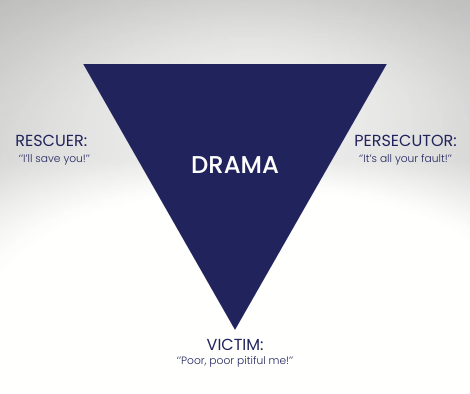Have you ever been thrown a new situation on the job, or been asked to deal with a sudden development or requirement that you didn’t understand at first? Have you ever been confronted with an unexpected change that affected your ability to connect with, and deliver value to, a prospect? Have you ever felt like a buyer, a colleague, or a superior dumped a problem in your lap, a problem you really didn’t feel ready to solve?
We all have. Now comes the tough follow-up: Were you ever tempted, even for a moment, to respond to the new situation you faced from one of these three points of view?

Even if you haven’t encountered this model before, there’s an excellent chance you have found yourself caught up in the popular game this image describes. The graphic above is known as the Drama Triangle. It’s a social model developed by Stephen Karpman, a student under Eric Bern – the father of Transactional Analysis theory. And it’s a game-changer for sales professionals.
Karpman’s Triangle tells us that, in dysfunctional situations, human beings may find themselves feeling resentful and hard done by, at the expense of their own personal agency (VICTIM) … or they may find themselves reaching for their Superman cape so they can leap to the rescue of someone they think is in trouble in the name of truth, justice, and the American Way (RESCUER) … or they may convince themselves they have every good reason to be vengeful and/or blaming in their relationships with others (PERSECUTOR).
All of that is drama. Ego thrives on drama. And drama is the opposite of keeping pace with change, because drama degrades communications. Adopt any one of the three positions in the Drama Triangle, and your ego will be well and truly hooked into playing a losing game – a game that always ends up costing sales teams money, in the form of commissions, lost opportunities, and, yes, high staff turnover.
Meaningful business partnerships -- the kind that benefit both sides, endure, and pay off financially in both the short and the long term, are functional. They find ways to adapt constructively to change. Drama, as you’ve probably already gathered, is dysfunctional. It’s the opposite of professional, adult-to-adult communication about new situations, new resources, and new opportunities.
Effective sales professionals learn to step aside from the drama. Which, let’s face it, usually takes some effort, because human egos are easily hooked. And drama is addictive. Addictive or not, the Drama Triangle is a terrible strategy for keeping pace with change.
Karpman’s model was designed for one reason only: to help people identify dysfunctional communication patterns. It works – because it helps you identify, and disengage from, situations where you’re not communicating effectively, peer-to- peer, adult-to-adult, about change.
Side note: The fact that this model works doesn’t mean there is no such thing as a victim in real life. If you’re hit crossing the street by a drunk driver, you are a victim of that person’s poor decisions. The point here is not to remove the idea of victimhood, or heroism, or persecution, from everyday life, but to better understand when these ways of looking at the world keep us from communicating with each other as well as we could.
The martial arts star Bruce Lee was once asked, “What’s the best way to avoid a punch?” His reply: “Be somewhere else!” That’s great advice when it comes to the martial art of avoiding getting caught up in the drama with our prospects, colleagues, or direct reports. As professionals, we always want to be somewhere else than our default (that is, most familiar) spot on the Drama Triangle. And that somewhere else is always going to be a reasoned, peer-to-peer conversation about the challenges we face and our best response to them, regardless of where those challenges may have originated or where they seem to be headed.
If you’re serious about keeping pace with the rapid, accelerating levels of change in your selling environment – and in the world at large – it’s probably time to get serious about recognizing the points on the Drama Triangle. So you can step away, politely but firmly, from the drama. Looking for help on removing yourself and/or your team from the Drama Triangle? Let’s connect.





